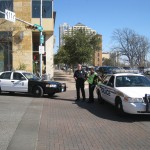There is no legal distance away from police you should be when recording their actions, but police acknowledge there could be a problem if you are close enough to distract an officer from his or her duties.
How far from a police officer do you have to be in order for him to feel safe? It’s sort of a humorous question when you think of it. I prefer: How far does an officer have to be from you in order for you to feel safe. The Austin Police Department recently took on the issue of filming cops, nearly instating a distance limit of 50 or 60 feet, before deciding against it and leaving that distance up to the officers at the time of the filming.
 “I don’t think there’s a practical way of doing that,” said Assistant Police Chief Sean Mannix. “There is no magic number of feet. The officer is going to make a determination of how much of a buffer zone they’re going to need to keep themselves safe, and they’ll communicate that to folks at the time.”
“I don’t think there’s a practical way of doing that,” said Assistant Police Chief Sean Mannix. “There is no magic number of feet. The officer is going to make a determination of how much of a buffer zone they’re going to need to keep themselves safe, and they’ll communicate that to folks at the time.”
Immediately following the arrest of activist Antonio Buehler for interference with public duties (recording cops), the Austin police Commander Troy Gay first mentioned the possible buffer zone. He said it wouldn’t be an “official policy” but a guideline for officers.
More recently, Mannix said the idea was never “seriously contemplated,” according to the Statesman.
According to Mannix, the basic “rule of thumb” for officers is that if they are having to pay more attention to you (as the amateur photographer or videographer), than the issue at hand, and they alert you to that fact, you could be arrested for interfering.
On August 28, a bulletin was issued to officers advising them to give clear verbal commands to the people who they believed were interfering with their duties, telling them to move to a specific location where they would not interfere, and giving two warnings before making an arrest.
Buehler has become a common name in Austin, bucking the police and filming whenever he thought it was necessary. He founded the group Peaceful Streets Project, which focuses on holding local police accountable through filming and posting such encounters online.
In January of this year, he was arrested after stopping to take photos of an arrest at a gas station in Central Austin. He faces charges of harassment of a public servant—a third degree felony with a potential sentence of 10 years in prison. Those charges are pending.
More recently, he was accused of filming an arrest at a disturbance on Sixth Street. His filming, at a distance of 15 to 20 feet was said to make the arrestee agitated and uncooperative. Buehler was eventually arrested on that night too.
You do have the right to film police. But they maintain the ability to say that your filming is causing an interference. If they can justify this accusation, they can arrest you and charge you with a crime.
If you are arrested for filming the police or for exercising any of your other rights, we may be able to help. When you are charged with a crime, you need someone on your side on your day in court—someone looking out for your rights and your best interests. Contact our offices today to discuss your case with a local attorney.








[…] of “interference” remains to be clearly established in most states (in a recent Austin case, that call was up to the officers rather than a set policy), that’s a separate […]